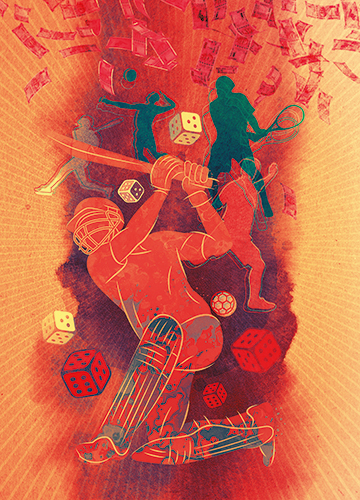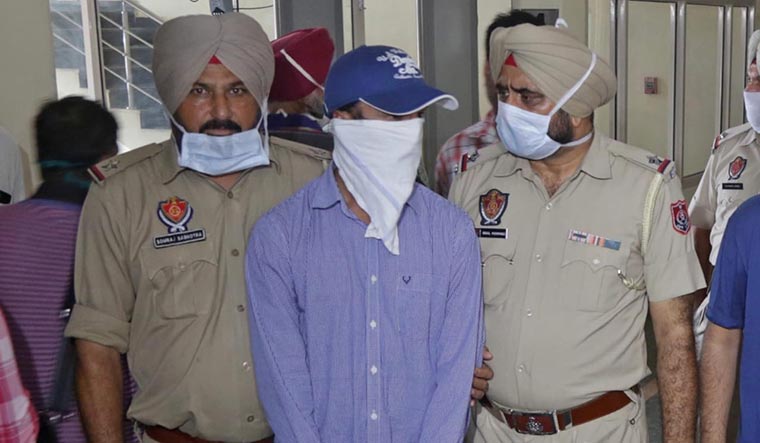Fans in need of a fix might have chanced upon a rare live cricket match streaming on YouTube on June 29—a Uva T20 league game played in Badulla, Sri Lanka. Except it was not. It was a fake match played at the Strokers Cricket Association ground, in a village about 16km from Mohali, Punjab.
The privately owned ground, located in Sawara village in Landran, sits in the middle of farmland and has hosted many corporate matches, leagues and small-time tournaments outside the purview of the Punjab Cricket Association and the Board of Control for Cricket in India. It is temporarily closed.
A police crackdown revealed that the ground had hosted the “Uva T20 league” during lockdown. Uva is a province in Sri Lanka. The league was promoted on various apps and websites, and live-streamed on apps like Fancode, Diamond, Sky, Lotus, Tenbet and Spin. Some sites even claimed the presence of former Sri Lankan national players in the league.
As news of these matches broke, the Uva province cricket association in Sri Lanka denied any association with the league. The BCCI anti-corruption unit and the Punjab Police intervened and the league was, in anti-corruption parlance, “successfully disrupted”. The promoter and six accomplices were arrested. The players had been wearing masks during play and were thus hard to identify.
The man behind the league, Ravinder Dandiwal, is a known “corrupter” whom an Australian daily had accused, in June, of “fixing tennis matches in Brazil, Egypt and Thailand”. The Victoria Police is investigating him.
Kuldeep Singh Chahal, the Mohali senior superintendent of police, described Dandiwal, 35, as an expert in organising fake or fixed matches; he had earlier held matches advertised as being from Afghanistan and Nepal. Chahal told the media that Dandiwal had admitted to being in touch with some bookies in Delhi. Among his accomplices was cameraman Durgesh, also from Delhi, who provided equipment for the telecast of the matches.
Dandiwal, now out on bail, had also formed his own Cricket Council of India, whose logo resembles the BCCI’s own. Originally from Rajasthan, the Mohali-based Dandiwal is also founder and chairman of the Cricket Premier League and owns a sport-cum-player management firm called Ultimate Sports Management.
Ajit Singh, head of BCCI’s anti-corruption unit, told THE WEEK: “Dandiwal was on our watchlist. He is a free operator. He organised a league for the purpose of betting. You create odds and know the end result for the purpose of making money; it is as simple as that.”
The “Uva T20 league” was not the only one held in India. Reportedly, a Universal T10 League took place in Kurukshetra, Haryana, between June 2 and 8. Live matches from this “tournament” were telecast on apps like Cricheroes and Cricclubs. Two months earlier, the International Cricket Council had slapped a two-year ban on Deepak Aggarwal, one of the owners of the Sindhis franchise in the 2018 T10 league played in the UAE. As per the ICC and the BCCI, Aggarwal is reportedly a known bookie.
“He started his own league during lockdown in Noida,” said Singh. “He gathered a number of players who wore face masks so that they could not be recognised and got [the matches] live-streamed. Bets were placed. We asked the Noida Police to take action. They were booked under the pandemic act for violation of prohibitory orders. More than 51 persons were arrested.”
In July, the Limassol Gladiators, one of the five teams in the European Cricket Series Cyprus, was suspended following its match against Amdocs. Reportedly, one major betting company refused to pay out on the match, which was streamed on various platforms worldwide. The ICC’s ACU had found suspicious betting patterns before the match.
Cricket aside, football and eSports, too, have had their run-ins with “match-fixing” during lockdown. Several “pop-up matches”, played with the sole intention of corruption and fixing, were reported during the lockdown.
Sportradar, one of the world’s leading sports integrity firms, recently red-flagged six matches of the Goa Professional League for “suspicious betting patterns indicative of match manipulations”. Sportradar brought it to the notice of the Asian Football Confederation, which in turn alerted the All India Football Federation. Javed Siraj, AIFF’s integrity officer, sought a report from the Goa Football Association, which confirmed that the matches “detailed in the report were fixed”.
With Covid-19 halting major sporting activity, desperate bookies and fixers have eyed live matches across sports that can fly “under the radar” of administrators and anti-corruption officials.
Oscar Brodkin, Sportradar’s director of intelligence and investigation services, recently published a white paper called “Ghost Games—An Explanation”. “(A ghost match) is a match which does not take place as stated and is falsely advertised to bookmakers, punters and the public in order to achieve profits from betting markets,” he wrote. “Perpetrators have advanced knowledge of the final score, which they have decided.”
These are different from fixed matches, and anti-corruption investigators say ghost games are not prevalent in cricket yet.
In a presentation at a sports policy symposium in June, Brodkin also said that fixing was “rife” in eSports and forecast it to rise further. During the lockdown, with no on-ground sports, gaming and eSports hit a new high. “Match fixing in eSports is incredibly widespread as performances can be easily manipulated,” he said in the presentation. “It has a young and vulnerable audience and the governing bodies are yet to organise themselves effectively enough to deal with this issue.”
According to Brodkin’s report, the lockdown also saw corrupters targeting new, amateur or youth leagues with fewer entry barriers. Another point raised was that players were now more vulnerable as their salaries had been reduced or cut altogether. “There will be a heightened risk in the short term of approaches to players, managers or officials who have not been paid or clubs that are documented as not having paid their players,” the report said.
Brodkin’s presentation also warned administrators of approaches by organised crime groups or lone wolves, particularly if the leagues were from poorer countries. The inroads made by fixers now will pay dividends when more leagues return to normalcy.
The presentation also highlighted the possibility of fixers buying clubs, across sports, which are going under because of a cash crunch. Hence, suspicious player transfers, too, are being noted. “Match fixers will try to place their players,” said Brodkin, “or those wanting to fix will move themselves, in unusual directions.”



